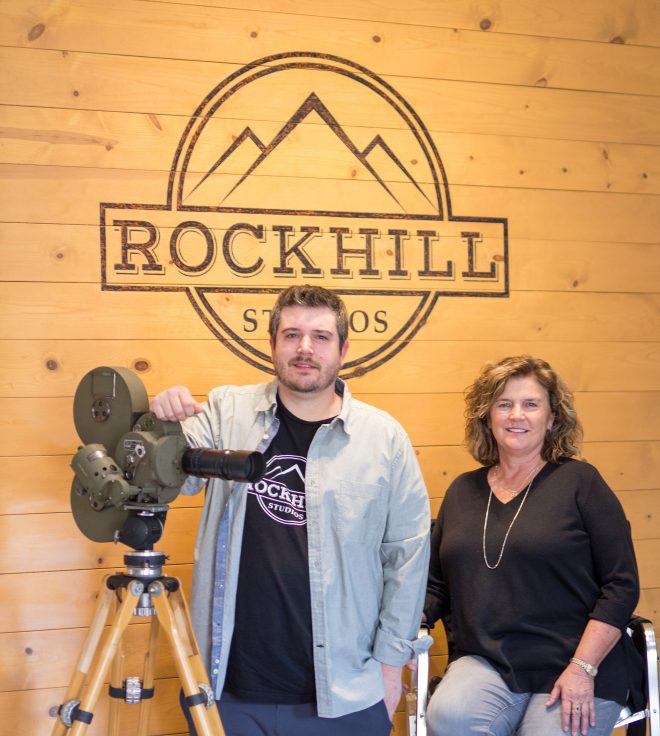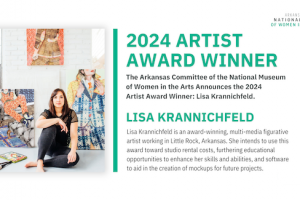A LIGHT ON THE HILL

Rockhill Studios changed the game for Northwest Arkansas filmmaking. We chatted with Blake and Kerri Elder about all they have accomplished and what’s next.
INTERVIEW / KODY FORD
Over the last few years, Rockhill Studios has emerged as a major player in the Arkansas film industry. Founded by producer and cinematographer Blake Elder and real estate investor Kerri Elder, Rockhill has produced their own original films such as Door in the Woods and Valley Inn and served as producers on films such as American Cherry and F.R.E.D.I that have come to the state for production. We spoke with them about launching their studio and the role they have played in growing the film industry in Arkansas.
Let’s just start back from the beginning. To our understanding, sort of the genesis of this, Blake, when you were a kid and would visit your aunt, Kim Swink—Kerri’s sister—who worked as a producer in New York City and her husband, Chris Spencer, who also worked in the industry. Being around that growing up, what was it that made you fall in love with filmmaking?
Blake Elder: [J]ust the whole process, the cameras—it was just always intriguing to me and I was a big fan of movies anyways, so it was just became a natural passion I had and, you know,with their knowledge, it was kind of easy to pick their brain at an early age. And it was just very interesting to me, so that just was more fuel to the fire.
When did you get your first camera and start shooting?
Blake Elder: I think I just picked up my parents VHS camera or something back in the day and just start messing around. Maybe around when I was like 12 or so,my parents got me a decent camera when they started to see that this interested me.
Kerri Elder: It was before that, Blake, because I’ve got recordings of movies that you made when you were eight, eight…I remember you and Kim did a movie… So it was early on that you had access to a camera and began to write scripts.
Kerri, from a mom’s perspective back then—when young Blake was grabbing a camera and writing a script, how did you feel about it? Were you excited about it from the beginning or was like, oh, this will pass and he’ll play baseball?
Kerri Elder: We loved it and supported it from the beginning and Blake was exceptional with the camera. He and his friend, Caleb Fanning—they just got through making the short film “Blood on the Risers”—they began creating films. And so we supported it and encouraged Blake even when he was in college. And he really wanted to just specialize in filmmaking. And we encouraged him to do so. And that is what motivated him to go to New York at that time.
Kerri, you’ve been working in real estate for years, and then your sister’s bringing a movie, Valley Inn, to Arkansas. What was it that inspired you to get directly involved with the process of making it?
Kerri Elder: I was able to help raise the financing for it, because that is my background. I also participated in the financing of the film as well, but I wanted to learn and see what it was like. Prior to this, I had never been on a set and never really been around the filmmakers themselves and how the day-to-day making of a movie happened. It was really important for me to be able to learn that and what things cost, dealing with unions, and the incentives. It was very, very different from the career that I had in real estate investing, so that was fun. It was a challenge, but that was really the piece that I brought to the table for them.
And so that skill that you developed at being able to sell investors— it’s a very important skill and you need that person on the team at some point.
Kerri Elder: That’s right—you do. That’s one of the things that Blake and I have always been able to do together, balance our skill sets and I don’t try to get involved in the creative. I look at the numbers once they’re put together on a budget, and he takes it from there with the creative, from choreographing our amazing local crew, resources, and our great locations .
So, you don’t build out the budgets on the project, you’ll have somebody else who does it. How deeply do you get involved?
Kerri Elder: We are involved pretty quickly, and have experienced resources available to collaborate with on a fine-tuned budget deliverable. Then it may go through multiple revisions before it’s finalized. We never start a movie without a launch budget.
So going from Valley Inn to launching your own studio—how much of a lift was that to get from the initial idea to the opening day of Rockhill?
Blake Elder: We saw the glaring need for facilities and more resources for film productions; exactly what Arkansas was missing. As a result of much research, we built exactly that… state of the art facilities including a premier soundstage and with the excellent crew base in Arkansas, we are seeing the industry grow more than ever.
Well, over the years you know, as you guys have been doing all these different projects, what are some of the ones each of y’all are the most proud of that Rockhill was involved in?
Blake Elder: I’d have to say Valley Inn for sure, because that was the launching point. I’m proud of all of them, honestly.
Kerri Elder: To the Stars, we felt like it was a great story. It got into Sundance and gave Rockhill a name outside of Arkansas, which then started bringing opportunities to us. I believe that movie made the biggest difference for us.
How do you feel about your role in growing Arkansas filmmaking?
Blake Elder: You’re absolutely right. There’s a film scene in Jonesboro. El Dorado has their film festival and that’s right there on the border with Louisiana. They’ve done an unbelievable job. Now Fort Smith is blowing up. So, it’s really incredible to see. It’s exciting. I’m just glad Rockhill just has had a part.
Kerri Elder: Of course the incentives are good and understanding the benefit and how to present that compared to other states is advantageous for Arkansas, as it is competitive with other states when you look at it in a comparison dollar-for-dollar way, not just the percentage. It’s all about educating why our state is amazing to film in.
Are there any unreleased projects you guys have participated in recently that you’re able to talk about?
Blake Elder: We’re really excited about who we’re working with right now on upcoming projects. We’ve had some of these connections with the Viola Davis Company, JuVee. We’re involved in the development of…Girls Like Us that is being written right now. The script is based on the book…we’re really excited about that relationship. We’ve partnered with Brittany Yost, who has a Sony episodic that we’re hoping to get to do here in Arkansas. As of now, we have six films in the pipeline for 2022-2023 covering many relevant cultural and societal focal points, ranging from women rights, mental health, racism, sex trafficking and immigration rights to name a few.
And let’s say I was an Arkansas filmmaker, and I wanted to bring my project to Rockhill and pitch to you guys. How would one go about that?
Blake Elder: We vet the scripts and if we like the project and it’s something we want to pursue, we’ll take it to the next level.
// ROCKHILL.STUDIO
IG // @ROCKHILL_STUDIOS
// FACEBOOK.COM/ROCKHILLSTUDIO
// VIMEO.COM/ROCKHILLSTUDIOS





Comments